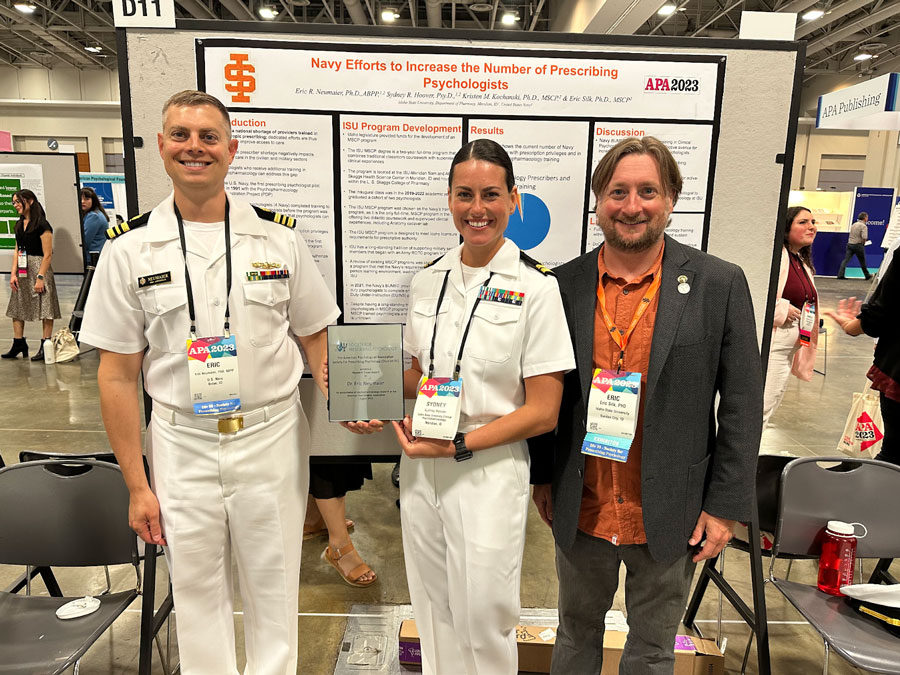Anchored in Idaho
The U.S. Navy’s Unexpected Ties to Idaho and the Clinical Psychopharmacology Program at Idaho State University

In Idaho, a revolution in mental health care is unfolding, rooted in the efforts of the U.S. military and the Department of Defense (DoD). The development of the Masters of Science in Clinical Psychopharmacology (MSCP) program at Idaho State University is a testament to the evolving role of psychologists in the treatment of mental health conditions. With the goal of improving access to care, particularly in underserved and rural communities, the program is shaping the next generation of prescribing psychologists and clinicians who combine their understanding of mental health with the ability to prescribe medication.
The roots of prescribing psychology can be traced to the late 1980s when the military faced a serious mental health care shortage, particularly in remote or deployed settings. Psychologists were well-versed in therapeutic interventions, but they couldn’t prescribe medications, leaving a gap in comprehensive care. For service members in need of treatment for conditions such as depression, anxiety, or post-traumatic stress disorder (PTSD), accessing a psychiatrist was often difficult or impossible.
The DoD had a vision for the mental health professional: prescribing psychologists. The U.S. military saw the potential of expanding psychologists’ roles to include the ability to prescribe medication, thus enhancing their scope of practice and filling the gap in mental health care.
In 1991, the DoD launched the Psychopharmacology Demonstration Project (PDP), a groundbreaking initiative aimed at training military psychologists to prescribe medications. The PDP offered training, combining advanced coursework in pharmacology, neuroscience, and clinical medicine, along with supervised clinical experiences.
The success of the PDP was undeniable. Psychologists trained under the program demonstrated that they could provide safe and effective medication management alongside traditional psychological therapies. Their ability to bridge both psychological and pharmacological treatments became a model for future programs.
As the military paved the way for prescribing psychologists, the idea began to gain traction in the civilian world. States with large rural populations, where psychiatrists were scarce but mental health needs were high, began exploring the possibility of granting prescription privileges to licensed psychologists with advanced training in clinical psychopharmacology. In 2002, New Mexico became the first state to pass legislation allowing prescribing psychologists to practice in civilian settings, followed by Louisiana, Illinois, Iowa, Idaho, Colorado, and Utah. Meanwhile, universities recognized the need to develop comprehensive educational programs to train civilian psychologists to meet these evolving demands.
Recognizing both the growing demand for mental health services and the potential for psychologists to play a larger role in psychopharmacological care, in 2019 ISU launched its own MSCP program. After the passage of a prescriptive authority for psychologists law in Idaho in 2017, ISU’s program was designed to provide evidence-based training for psychologists seeking to expand their scope of practice.
The goal is to equip psychologists with the knowledge and skills they need to safely and effectively prescribe medications for the treatment of mental health disorders. Students, who are already practicing, licensed psychologists, are trained to evaluate patients comprehensively, integrating their psychological expertise with an understanding of the medical and pharmacological aspects of care.
The program also emphasizes a holistic, patient-centered approach to mental health care. Students are taught to work collaboratively with other providers, such as pharmacists, primary care physicians, and psychiatrists, ensuring that patients receive the most comprehensive and coordinated care possible.
Prescribing psychologists serve as both therapist and prescriber, reducing the need for patients to see multiple providers, which is especially important in regions where travel distances and wait times for psychiatric appointments can be significant.

Idaho State University’s MSCP program, launched in response to growing civilian and military demand for prescribing psychologists, soon became a magnet for military mental health professionals. Navy officer psychologists, in particular, saw the program as a vital opportunity to expand their clinical skills and better serve their fellow service members.
The MSCP program at ISU offers the exact kind of rigorous training the military values: a curriculum grounded in neuroscience, pharmacology, and clinical practice. For Navy psychologists, enrolling in the program allows them to deepen their understanding of psychotropic medications while integrating that knowledge with their existing psychological expertise. This hybrid skill set is crucial in providing comprehensive mental health care to service members, particularly in the high-stress environments of military life.
For these Navy officers, the program is not just about earning a degree—it’s about enhancing their ability to serve the men and women in uniform. Graduates of the MSCP program return to military service equipped to both counsel and prescribe, offering a rare combination of therapeutic and pharmacological treatment options. This is especially important as mental health care continues to be a critical issue for active-duty service members and veterans alike.
Graduates of the MSCP program are uniquely positioned to make a difference, helping to alleviate the mental health crisis in rural America. As the program continues to evolve, it remains at the forefront of the prescribing psychology movement. With a growing body of evidence supporting the safety and efficacy of prescribing psychologists, more states are considering legislation to grant prescription privileges to appropriately trained clinicians.
The university is exploring partnerships with health care organizations and rural clinics to provide training sites for students and offer much-needed services to communities in need. Additionally, the program is continually updating its curriculum to reflect the latest advancements in pharmacology, neuroscience, and mental health care.
At its core, ISU’s MSCP program is about more than just training psychologists to prescribe medication. It’s about reshaping the mental health care landscape, providing more comprehensive, accessible, and patient-centered care. In this way, the legacy of the U.S. military and the DoD’s pioneering work lives on—through the clinicians trained at Idaho State University and the countless patients whose lives they touch.
